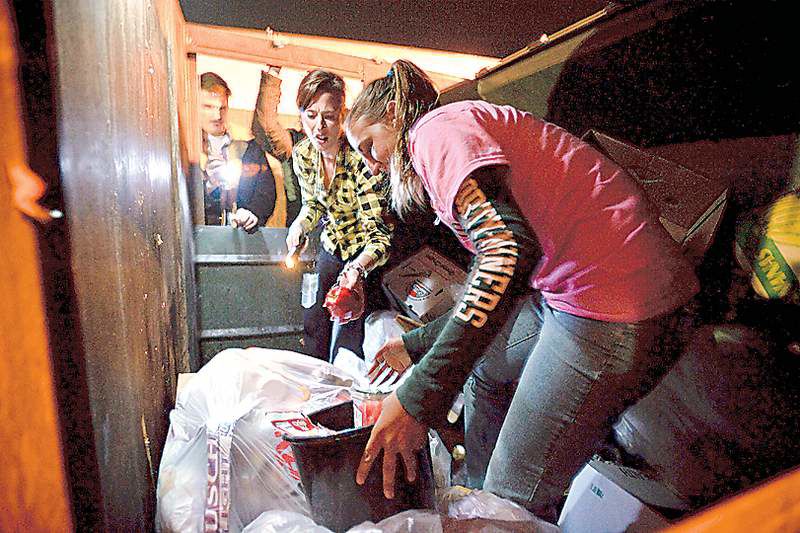Finding dinner in the Dumpster
Published 5:00 am Thursday, October 21, 2010

- Kaitlyn Tokay, front, and her friends say Dumpster diving is catching on. Here, they explore a supermarket site in Charlotte, N.C.
CHARLOTTE, N.C. — Dumpster diving is far from a fad with UNC Charlotte students, but 20-year-old Kaitlyn Tokay and her friends say it’s catching on.
A self-described community activist, she began digging through grocery store trash bins in May and blogging on Facebook about the “perfectly good” food she found, cooked and ate.
It was meant to be a monthlong experiment, to expose society’s continued wastefulness, even in a recession. But five months later, Tokay is still at it, only now she’s part of a team.
And as for her blog, readership is at 1,600 and growing.
“It has been an eye-opening experience to see not only what we throw away as a society, but how it can be used, with some imagination,” says Tokay, a junior majoring in communication studies.
“I decided to make it a lifestyle habit, and to perpetuate it. A lot of friends were amazingly grossed when I told them about it, but others say they admire it.”
Tokay and many other Dumpster divers consider themselves “freegans,” practicing a form of environmentalism based on minimal use of resources. Rescued food, hand-me-down clothes and found furniture are all part of the lifestyle.
Volunteerism is big, too, and Tokay does that by sharing her found food with the homeless, sometimes working with a program that serves meals on the streets of Charlotte.
Freegan or not, grocery stores maintain that Dumpster diving is a form of trespassing. Food Lion, for example, not only “strongly discourages” digging in Dumpsters, but says it will “take appropriate action as necessary to prevent this activity.”
‘A scavenger hunt’
Grocery stores note that there are compelling reasons food is deemed unfit, including damage, exposure and being past its “sell by” date. Some store chains solve this dilemma by donating whatever they can save. Last year, Harris Teeter gave 539,000 pounds of food to Second Harvest Food Bank, rather than see it go to waste, store officials said.
Tokay and her peers realize they’re considered a nuisance, which is why they only come out at night, between midnight and 4 a.m. Most work in teams, with one in the trash bin, handing out the loot to someone waiting on the outside.
Tokay typically works with several people, including Stephanie Braun, 23, a social work major who is also president of the UNCC Earth Club. Braun considers Dumpster diving a form of recycling, and has been on outings with as many as four people.
“We’re college students, so we’re already up at midnight, at coffee shops or doing our homework,” says Braun. “It’s really like going on a scavenger hunt, and it’s exciting, because you never know what you’ll find.”
Or whom you’ll meet.
Tokay once had the wits scared out of her when she stumbled onto a homeless man who was already in a Dumpster, looking for a meal.
And another time, she and Braun were diving and heard that dreaded “beep, beep, beep” sound that garbage trucks make when they’re backing up to something.
“I was terrified that I was about to be dumped into a garbage truck,” Tokay says. “Then, we realized that it was someone who was going to dump trash into the Dumpster.”
Awkward, indeed.
“I didn’t know what to do, so I got out of the Dumpster holding a bunch of bananas and offered the driver one. They didn’t know what to think.”
Is it good for you?
Jacob Hanks, 22, is a recent UNCC grad who is among Tokay’s partners. He’s been at it longer, though, having started last year after hearing about it from a friend who had been Dumpster diving in Portland, Ore.
There have been occasions when he’s gone with as many as seven people, creating a kind of party atmosphere. And at least once, he ran into another team of students who were complete strangers.
“They came up after we were already there and joined in. We split everything,” says Hanks. He says he gets most of his meals these days from trash bins. “There is an abundance of stuff. We’ve had times where we found enough food to fill up the entire kitchen floor, including pastries, packaged cakes, shrink-wrapped barbecue ribs and a lot of bread.”
Among Hanks’ observations is that Dumpster divers tend to be more active in the fall and winter, because the colder weather is “natural refrigeration.”
He says they also tend to eat better, because they find fruits, vegetables and meats that struggling college students can seldom afford. He and other Dumpster divers contend that much of this food was tossed out unnecessarily due to health regulations.
The USDA concurs, noting the country has no universally accepted system for food dating. In fact, it says on its website that many products should still be safe after the sell-by date, if handled properly and kept at the recommended storage temperature of 40 degrees or below.
Tokay says she’s living proof, having never gotten sick from eating items found in the trash. “Just because a product says it’s out of date on June 2, or whatever, doesn’t mean it’s gone bad exactly on June 2. A lot of times, they’re still good.”






